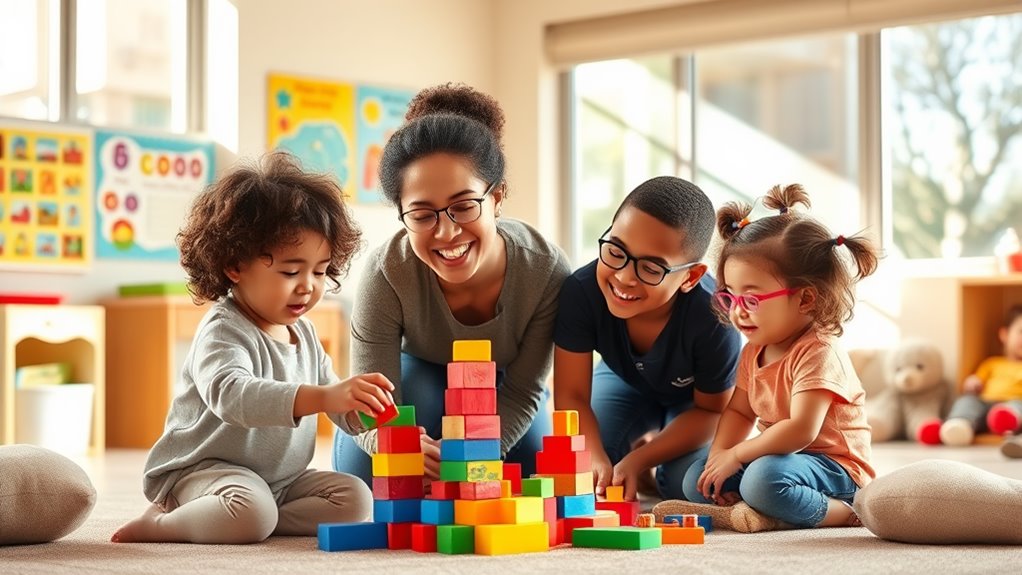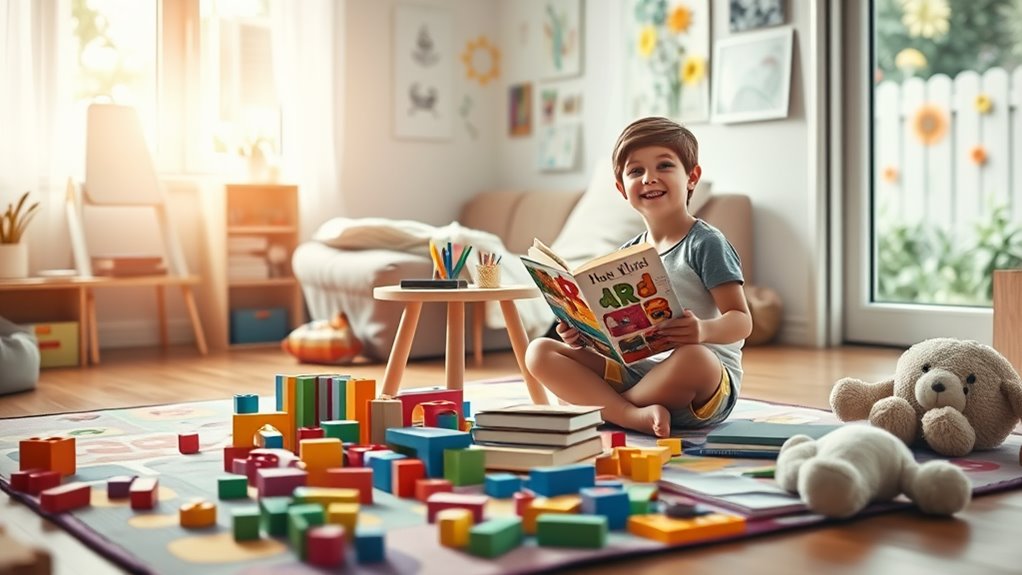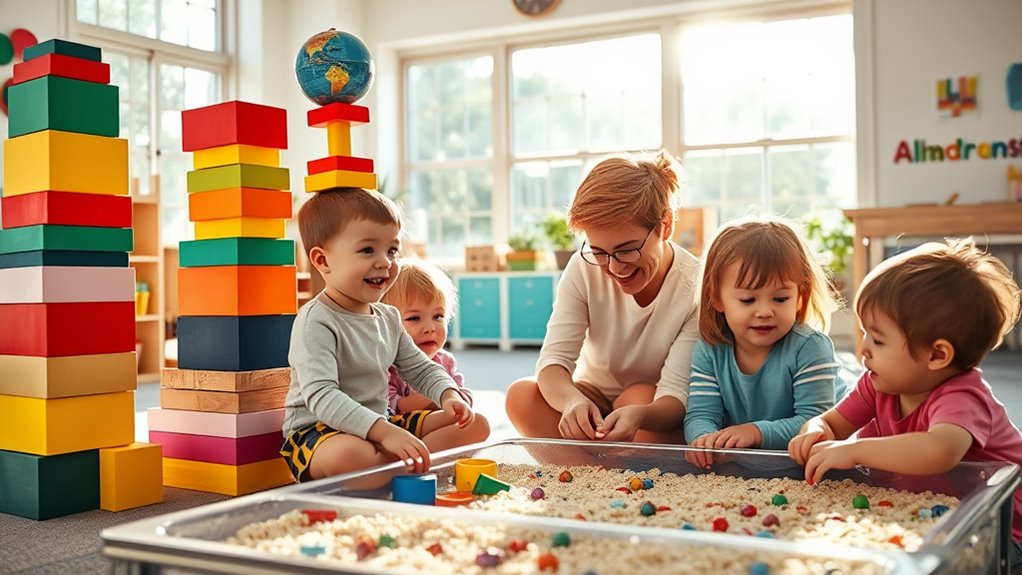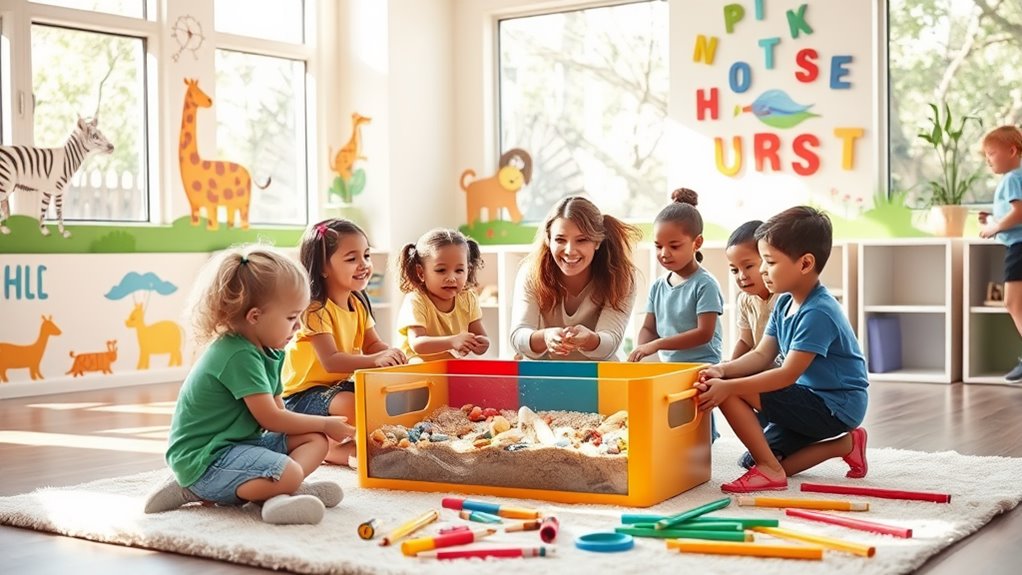Early Childhood Education Techniques Proven to Work!
Early childhood education techniques that work include play-based learning, structured routines, and active family engagement. When children play, they explore and develop critical thinking while enhancing creativity and language skills. Structured routines provide consistency, helping kids feel secure and improve self-regulation. Engaging families also nurtures children’s social-emotional development, fostering stronger community ties. Additionally, incorporating hands-on activities and regular feedback promotes a growth mindset and necessary skills. By embracing these methods, you’re setting your child on a path for lifelong success. Keep going, and you’ll uncover even more effective strategies for nurturing young minds.
Key Takeaways
- Implement play-based and hands-on learning to enhance critical thinking and foster creativity through child-led exploration and imaginative activities.
- Promote social-emotional development by encouraging peer interactions and modeling emotional regulation for healthy relationships and empathy.
- Establish structured routines and goal-setting practices to create consistency, reduce anxiety, and improve self-regulation among young learners.
- Focus on vocabulary development and reading skills by incorporating playful activities and daily read-aloud sessions to instill a love for language.
- Utilize diverse assessment strategies and constructive feedback techniques to monitor progress, tailor educational approaches, and promote a growth mindset.
Play-Based Learning
How does play-based learning enhance a child’s development? It fosters an environment where children thrive through child-led exploration and imaginative play. By engaging in activities that spark their curiosity, you allow them to take charge of their learning journey. This hands-on approach encourages critical thinking and problem-solving skills as they navigate new scenarios and challenges.
In play-based learning, children aren’t just passive recipients of information; they actively construct their understanding of the world. For example, when they engage in imaginative play, whether pretending to be chefs or astronauts, they develop language skills and creativity. These experiences help them articulate thoughts and express emotions, laying a strong foundation for future communication.
Moreover, play-based learning nurtures a sense of autonomy. Children learn to make choices, take risks, and explore their interests, all of which build confidence and resilience. As you encourage this form of learning, you’re not just teaching academic skills; you’re also equipping children with the tools they’ll need for lifelong success. Embrace play-based learning, and watch as your child flourishes through exploration and creativity.
Social-Emotional Development
Social-emotional development is crucial in shaping a child’s ability to interact with others and understand their own feelings. As an educator, you play a pivotal role in nurturing emotional intelligence, which forms the foundation for healthy relationships and effective communication. By fostering an environment that encourages exploration of emotions, you allow children to express their feelings and recognize those of their peers.
Encouraging peer interactions is key. Create opportunities for group activities, where children can collaborate, share, and resolve conflicts. These experiences not only enhance their social skills but also promote empathy and understanding. When children learn to navigate their emotions and those of others, they develop resilience and adaptability—skills essential for lifelong success.
It’s also beneficial to model emotional regulation. Share your feelings and demonstrate how to manage them effectively. This helps children see that it’s okay to express themselves and that they can do so in a constructive manner. Remember, social-emotional development isn’t just about managing feelings; it’s about creating connections and building a supportive community that empowers every child to thrive.
Structured Routines
Structured routines play a vital role in early childhood education, as they offer consistency that kids thrive on. When you create predictable environments, children feel more secure and ready to learn. You’ll find that this stability not only supports their development but also fosters positive behaviors and emotional well-being.
Benefits of Consistency
A predictable daily routine acts like a comforting anchor for young children, providing them with a sense of security and stability. When you establish structured routines in your classroom or home, you’re tapping into the powerful consistency benefits that come from knowing what to expect. This predictability helps reduce anxiety and fosters a positive emotional environment, allowing children to thrive.
The importance of routine cannot be overstated. Children who follow consistent daily schedules tend to develop better self-regulation skills, as they learn to anticipate transitions and manage their time effectively. When they understand what comes next, they can focus more on learning rather than worrying about the unknown.
Moreover, routines create opportunities for reinforcement and practice. For instance, during snack time or cleanup, you can encourage specific behaviors and expectations, leading to better social skills and responsibility. Over time, these consistent experiences contribute to their overall development and academic success.
Creating Predictable Environments
Creating a predictable environment for young children is essential for fostering their growth and learning. When you establish predictable schedules, you help children feel secure and confident. This structure allows them to focus on sensory exploration without the anxiety of uncertainty.
Begin by outlining daily routines that include consistent times for activities like meals, play, and rest. This consistency not only reduces stress but also enhances their ability to understand time management and transitions. For instance, when children know what to expect, they can better engage in exploratory play, which is crucial for their cognitive and social development.
Incorporate visual schedules or charts to reinforce these routines. Children can visually track their activities, which adds another layer of predictability. Additionally, create specific spaces for different types of play, ensuring children understand where to go for sensory exploration or quiet time.
Hands-On Activities
Hands-on activities play a crucial role in early childhood education, as they foster active engagement and real-world learning experiences. These activities allow children to explore their environment through sensory exploration. When kids touch, feel, and manipulate materials, they develop critical cognitive skills, enhancing their understanding of concepts in a tangible way.
Incorporating hands-on learning can significantly boost a child’s creative expression. Activities like painting, building with blocks, or engaging in role-play not only stimulate imagination but also encourage problem-solving and collaboration with peers. You’ll notice that when children are involved in hands-on tasks, they become more invested in their learning, leading to deeper comprehension and retention of information.
Additionally, hands-on activities cater to various learning styles, ensuring that each child’s unique strengths are nurtured. By integrating sensory experiences into your lessons, you create an inclusive environment where all children can thrive. Remember, the goal isn’t just to teach but to inspire. By providing opportunities for hands-on engagement, you empower children to discover, innovate, and express themselves creatively, laying a solid foundation for lifelong learning. Embrace these techniques, and watch your students flourish!
Family Engagement
Engaging families in early childhood education is essential for fostering a supportive learning environment. When you prioritize family involvement, you create a partnership that enhances your child’s development and strengthens community ties. Here are some effective strategies you can implement:
- Host parent workshops: Organize sessions where parents can learn about developmental milestones and effective parenting strategies. This not only educates but also empowers families to support their children’s learning at home.
- Create family events: Plan activities that encourage families to participate in their child’s education, such as open houses or themed family nights. These events build a sense of belonging and connection.
- Utilize communication tools: Regularly share updates via newsletters, emails, or apps. Keeping families informed fosters transparency and encourages their involvement.
- Encourage volunteering: Invite parents to participate in classroom activities or field trips. This hands-on engagement allows them to witness their child’s learning environment firsthand.
Language and Literacy
Building strong family connections naturally paves the way for fostering language and literacy skills in early childhood education. When you engage with your child through reading, storytelling, and conversations, you’re not just spending quality time; you’re also enhancing their vocabulary building and phonemic awareness. These elements are crucial for developing strong literacy skills.
Encourage your child to explore new words in various contexts. Use everyday situations to introduce vocabulary by naming objects, describing actions, or discussing feelings. This interactive approach makes learning enjoyable and meaningful. Incorporate playful activities like rhyming games or songs, which can boost phonemic awareness—helping your child recognize and manipulate sounds in words.
Don’t underestimate the power of repetition; it reinforces learning and builds confidence. Reading aloud to your child daily not only strengthens their listening skills but also instills a love for books. As they listen, they absorb new vocabulary and begin to understand the structure of language.
Assessment and Feedback
Effective assessment and feedback are essential components of early childhood education, as they help you understand your child’s progress and areas for growth. By implementing formative assessments regularly, you can gain insights into how your child learns and develops. This ongoing process allows you to tailor your approach, ensuring that you meet their unique needs.
Constructive feedback is crucial in this journey. It provides your child with specific, actionable insights that foster confidence and encourage improvement. Remember, you want to create an environment where feedback is viewed as a positive tool for development.
Here are some key strategies to enhance assessment and feedback:
- Use diverse assessment methods: Incorporate observations, checklists, and student self-assessments to gather well-rounded insights.
- Focus on strengths: Highlight your child’s strengths before addressing areas for improvement, promoting a positive mindset.
- Set achievable goals: Work together with your child to establish specific, measurable goals that guide their learning journey.
- Encourage reflection: Invite your child to reflect on their own learning experiences, fostering a sense of ownership and responsibility.
Frequently Asked Questions
What Age Group Benefits Most From Early Childhood Education Techniques?
You’ll find that toddlers, ages 1 to 3, truly flourish in their development during this time. Early education lays the groundwork for preschool readiness, nurturing essential skills that set them up for future success.
How Can Parents Support Learning at Home?
You can support learning at home by engaging in fun learning activities that spark curiosity. Your active parental involvement creates a positive environment, encouraging exploration and reinforcing concepts, ultimately fostering a love for learning in your child.
Are There Cultural Considerations in Early Childhood Education?
Cultural diversity colors educational practices like a vibrant mural. You should embrace different backgrounds, respecting traditions and values. By incorporating diverse perspectives, you enrich learning experiences, fostering inclusivity and understanding in early childhood education settings.
What Qualifications Should Early Childhood Educators Have?
To excel as an early childhood educator, you should pursue educator certifications and engage in ongoing professional development. These qualifications enhance your skills, ensuring you effectively support children’s growth and learning in diverse environments.
How Can Technology Be Integrated Into Early Childhood Education?
You can integrate technology in early childhood education by using educational apps that promote interactive learning. These tools engage kids, enhance their skills, and make learning fun, creating a dynamic environment for exploration and growth.




